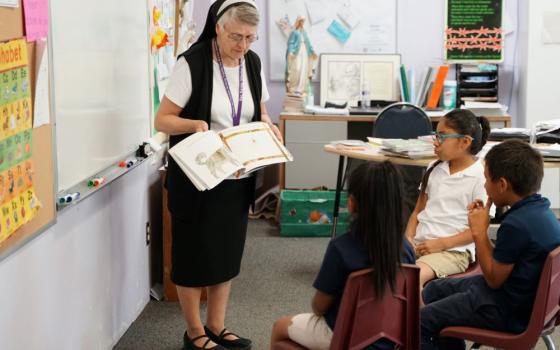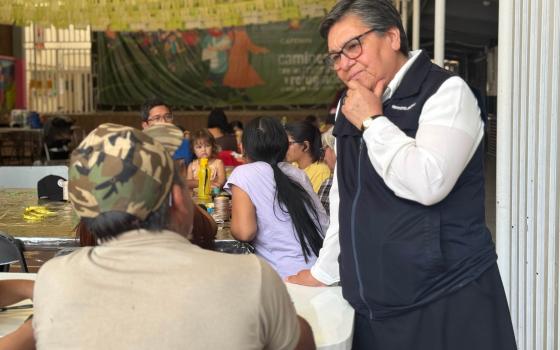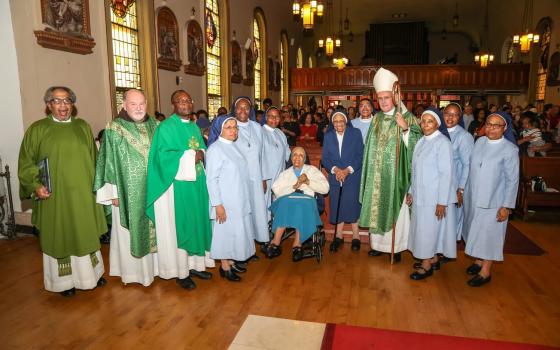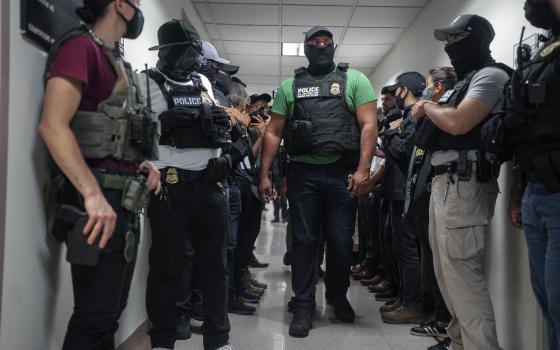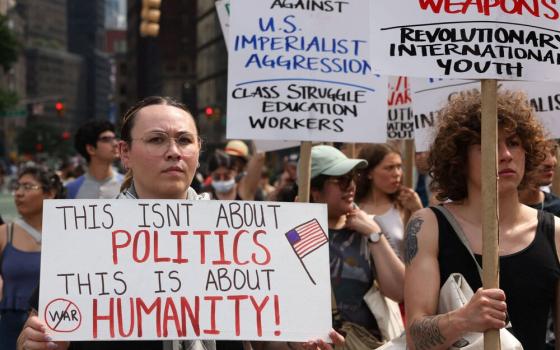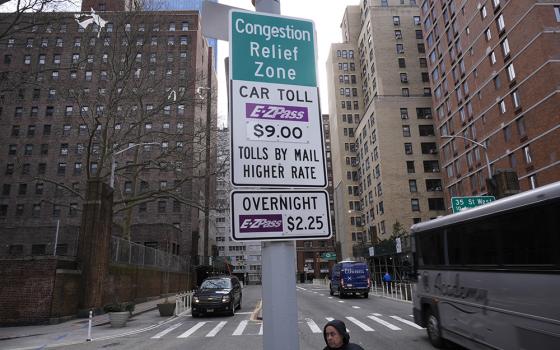Benedictine Sr. Sue Fazzini and an inmate at the Pennsylvania State Correctional Institution Greene play with a puppy in training for Canine Partners for Life, a Chester County, Pennsylvania-based organization dedicated to training service dogs, home companion dogs and residential companion dogs. (Courtesy of the Pennsylvania Department of Corrections)
For more than 15 years, Benedictine Sr. Sue Fazzini has put a spotlight on the humanity of prisoners.
Fazzini heads the drug and alcohol treatment program at the Pennsylvania State Correctional Institution Greene, an 1,800-inmate facility for men in Waynesburg, southwest Pennsylvania.
Fazzini, 65, a member of the Benedictine Sisters of Pittsburgh, has spent her life in southwest Pennsylvania, an area of onetime steel mill towns like her native Donora. There, Fazzini grew up in an Italian-American working-class family.
A retreat at a Benedictine monastery in 1976 led her on a path to religious life. She studied theology and sociology at Carlow College after professing her vows in 1976 and later received a master's degree in counseling from Indiana University of Pennsylvania.
After stints teaching, Fazzini worked as a drug and alcohol counselor at an outpatient alcohol and mental health clinic in Waynesburg. She recalls her next step as serendipitous, and it happened in a grocery store on Martin Luther King Jr. Day in January 2004.
As she said in a profile for Greene County's Observer-Reporter: "I ran into [Pennsylvania State Correctional Institution Fayette supervisor] Laurel Harry and was telling her about my bad day at work. She said, 'Why don't you come work at the prison?' I said, 'What do I have to do?' She ripped a piece of paper off a potato sack and wrote the website on it. I took the [state civil service] test and by April I was a drug and alcohol treatment specialist. There were two openings that year, one in Fayette and one in Greene. I took Greene."
Fazzini's ministry has been featured in local television programming and at a 2015 TED Talk in Pittsburgh.
Advertisement
GSR: In the TED Talk you gave, you mentioned the role your family background had on your call and ministry.
Fazzini: I was one of 10 children, the second one. My dad worked in a steel mill, which later closed, and my mom was a housewife. God bless them both. They kept things afloat. They both instilled in us ideas of hard work and watching after each other. We had neighbors down the street who were having a hard time, and my mother provided them food.
My dad lost his job at the mill but later found work as an electrician, and he was always grateful for that job. My mother eventually got a bachelor's degree in social work, and she was a trailblazer: always writing letters to the editor, being an advocate for those in need, supporting women's rights, believing in equality and teaching us to help others. Both of my parents were examples to me.
Help us put your ministry into a wider context.
I think we over-incarcerate people in our country. There are far too many people incarcerated for drug- and addiction-related offenses. I think if we dealt with addiction issues more strongly in society first, they would not turn into problems that end up being criminal offenses that incarcerate people.
But once they are inside prison, it's up to me and my staff to work with the prisoners and to help them find the space where they can overcome their addictions. I tell the prisoners that it's their job to put me out of a job. I recognize it's not easy for them.
Benedictine Sr. Sue Fazzini cuts the grass at home in rural Greene County, Pennsylvania. (Provided photo)
Do you see your ministry as helping humanize a difficult situation?
I do think the inmate population is a marginalized group, and society is beginning to see that we can't just lock them up and throw away the key. There are many more programs to help reintegrate and rehabilitate those who will leave. That being said, some have caused great harm and traumatized others.
In an attempt to help humanize the situation, programs — such as victim-offender dialogue, when an inmate meets with the person they have victimized, and the Impact of Crime class, where speakers who are victims come in and talk with smaller groups of inmates about the impact their crime has had on their life — provide powerful opportunities for healing to begin. I assist with both of these programs and have seen firsthand the changes that have been made.
All of this aligns perfectly with the Rule of St. Benedict and the Gospel.
Help us further understand the challenges prisoners face.
In prison itself, day-to-day, life is hard. You're confined. You're in a cell with another man. You're forced to get along with him and the others. But the true challenge is when you leave, and that's all about support and whether you can find that or not. We have programs inside the prison to assist with the transition. We have two social workers who provide re-entry services. Now more than ever, there are resources to assist in a successful handoff.
Some of the men have support outside, particularly with their families. But many have burned bridges with their families, so the question is, can they repair that? The programs outside prison can help them become productive citizens. That's also what we try to do in prison with our addiction programs. If they can tackle their chemical addictions, they will be on their way to working things out on the outside.
But dealing with an addiction is not easy, even for those who have not had the added burden of being imprisoned. So, there needs to be integrated programs after release: job training; continued support like Alcoholics Anonymous, Narcotics Anonymous and SMART [Self-Management and Recovery Training]; efforts to help them reintegrate. When prisoners are released, they're not starting at zero. They're starting at negative five.
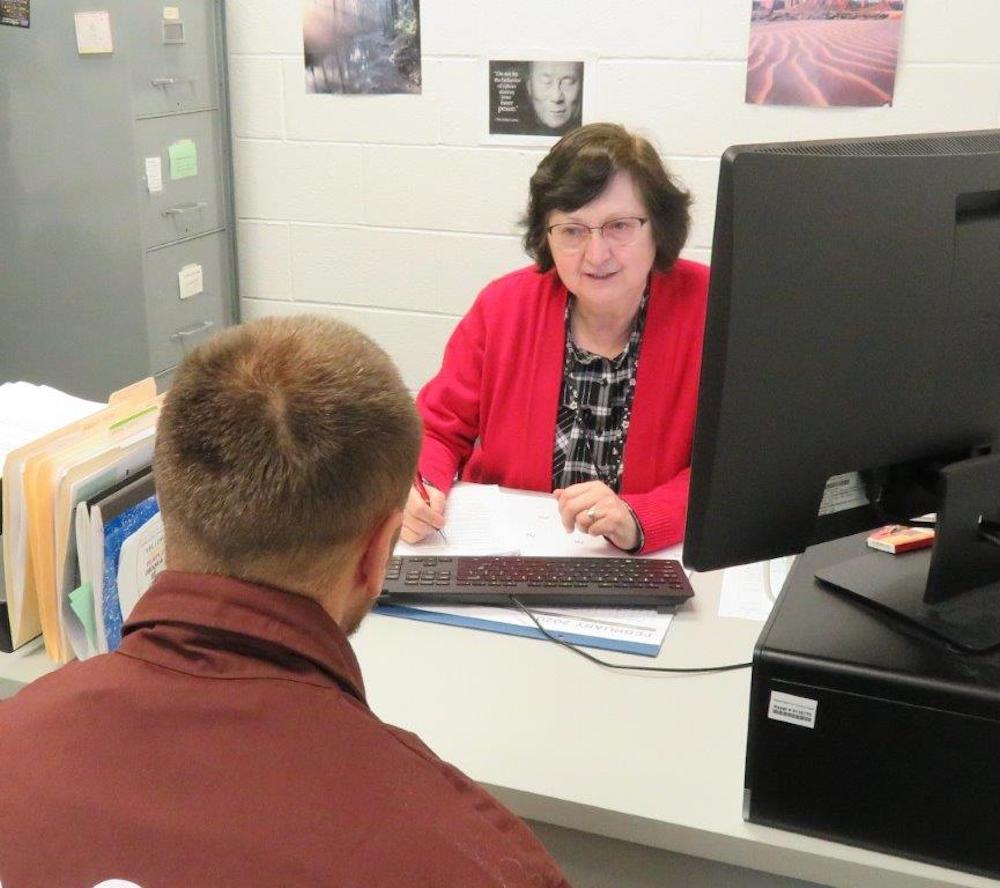
Benedictine Sr. Sue Fazzini speaks with inmate in her office at the Pennsylvania State Correctional Institution Greene in Waynesburg, southwest Pennsylvania. Fazzini heads the drug and alcohol treatment program at the prison. (Courtesy of the Pennsylvania Department of Corrections)
The image of prisons in the United States, particularly maximum-security facilities, is one of extreme danger. Have you ever worried about your own safety?
No, I have always felt safe. I've never been afraid, and in 16 years there, I've had few, if any, problems. They know who I am. I don't pull any punches when I need to. I answer their questions, and I tend not to sugarcoat things, and I'm honest. The prisoners know I respect them. I've learned that if respect is given, you get respect back. I've always respected the prisoners, and so they feel that respect and respond accordingly.
Do you hear from former prisoners after they leave?
About two months ago, I got a call from a man who had been released and is now in Minnesota. He was having success, and I was so pleased to hear that. I've even bumped into people while I've been in Pittsburgh. They cross the street to say hello. I love that. Phone calls from inmates who have "made it" are priceless. And it gives them continued encouragement to know we are proud of their efforts.
Why are some people successful and others not?
Think about our own motivation. Whether trying to lose weight or training to run a 5K race, some are successful, and some aren't. The first part of the equation is internal motivation and being willing to put in the hard work and sacrifice. The second part is a supportive group of friends or family to assist in achieving that goal.
Inside the prison, we work to provide the individual inmate supportive services needed upon re-entry and to provide an understanding of what he will encounter when he leaves the prison. But the reality is that starting over is tough. Finding housing, employment or simply finding one's way can be difficult. When times get tough, relying on those old patterns of behavior can easily creep back into life. Those who are successful overcome great odds.
What are your own challenges in the work?
It's truly part of my ministry to affirm the humanity of the prisoners, and it is wonderful work. But it can be exhausting emotionally and spiritually. I am very passionate and can get frustrated like anyone does, especially in a difficult environment. Certainly, I couldn't do it without my Benedictine community, who have been very, very supportive of me, particularly the older sisters. And I depend so much on my wonderful staff within the prison.
I see my work as piece of the wider puzzle, and it's our responsibility, all of us, to help bring hope into the world. That includes the prisoners: They have an opportunity to better themselves so that when they leave prison, they will have something to give. They do have something to give. We all do.
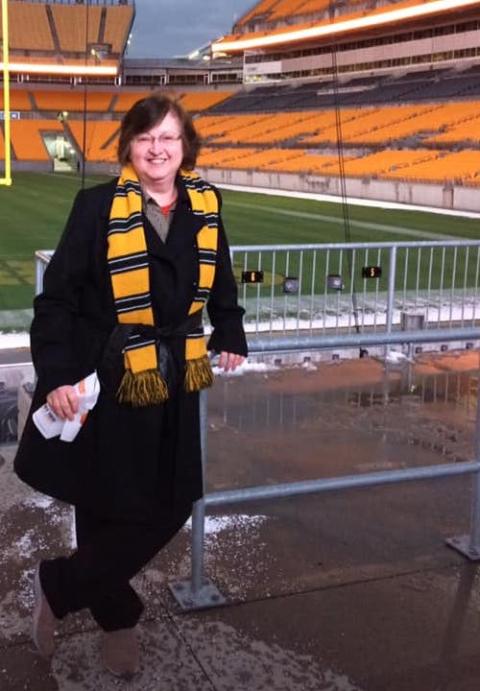
Benedictine Sr. Sue Fazzini at Heinz Field in Pittsburgh, Pennsylvania, home of the NFL Pittsburgh Steelers. Fazzini is a dedicated Steelers fan. (Provided photo)
I want to ask you about COVID-19 and prison, but pre-pandemic, what was your typical day like?
It's always something different each day, but the basic structure of the day has been to do individual assessments and then meet with the men in groups, with about 12 to 15 in a group. I run the groups, which are like classes, and it's important for the men to share their experiences with others. That's where the real work is done.
COVID has changed a lot of things. Things are more controlled now, and more work is being done within the cell than in an open group area. It's more like a correspondence course now. More work is done individually through paperwork.
The inmates in our groups reside in housing units throughout the institution. Prior to COVID, they would come to our program-services building for their groups; now, we as a staff deliver the work they need to complete to their cells. We interact at the cell door, which has a few challenges, but we've done a good job at explaining things and keeping groups running. We will be facing a new normal eventually, which will mean working in smaller groups, like eight to 10 people, but I think we'll be able to get there maybe by January.
We've had less than a dozen cases of COVID in the prison. That's due to parole violators returning to prison, and they've been immediately quarantined. We've erred on the side of caution, which is a good thing. One example of our being cautious is that our deputy superintendent records a town hall for the inmates each week. He answers any questions submitted through the week about the pandemic and the prison's response. The inmates understandably had many questions about COVID and the general running of the facility. He took the time to make sure all of their questions were answered, as communication is one of the best ways to prevent issues from arising. I think this extra communication has been very helpful to our population.
Tell us what keeps you alert spiritually.
As I think about my life and its relation to others, I think that we all face choices. I could have made a choice that landed me in a very different place. I could have even landed in prison myself if my life had zigged rather than zagged.
I can't say I haven't been in neutral at times. But having a ministry where I am doing something to bring hope to others is significant. My community is important to my life, and so is my morning prayer. And when I get a call from a former prisoner who says, "I made it," that's huge.
So many gifts have come my way that I didn't expect. I'm grateful that God has spoiled me.
[Chris Herlinger is GSR international correspondent. His email address is cherlinger@ncronline.org.]

